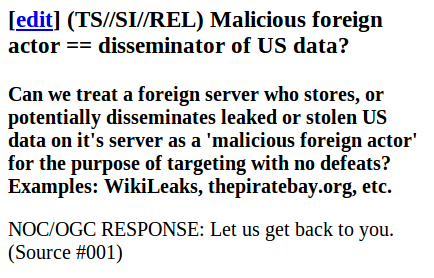The Intercept recently published an article and supporting documents indicating that the NSA and its British counterpart GCHQ surveilled and even sought to have other countries prosecute the investigative journalism website WikiLeaks. GCHQ also surveilled the millions of people who merely read the WikiLeaks website. The article clarifies the lengths that these two spy organizations go to track their targets and confirms, once again, that they do not confine themselves to spying on those accused of terrorism.
One document contains a summary of an internal discussion in which officials from two NSA offices discuss whether to categorize WikiLeaks as a "malicious foreign actor" for surveillance targeting purposes. This would be an important categorization because agents have significantly more authority to engage in surveillance of malicious foreign actors.
 The response provided by the agency’s general counsel and an arm of its Threat Operations Center was simply "Let us get back to you"—leaving the matter unresolved. The answer, of course, should have been an unequivocal "no."
The response provided by the agency’s general counsel and an arm of its Threat Operations Center was simply "Let us get back to you"—leaving the matter unresolved. The answer, of course, should have been an unequivocal "no."
Another document, branded with GCHQ's logo, showed passive surveillance of a website in January and February 2012. The keywords leading to the site, including “wikileaks” and “http://wikileaks.org/” indicate that the website under surveillance was WikiLeaks. As The Intercept explains:
By exploiting its ability to tap into the fiber-optic cables that make up the backbone of the Internet, the agency confided to allies in 2012, it was able to collect the IP addresses of visitors in real time, as well as the search terms that visitors used to reach the site from search engines like Google.
Yet another document shows the depth of the legal effort against WikiLeaks, indicating that the Obama administration "urged foreign allies to file criminal charges against Assange over the group’s publication of the Afghanistan war logs."
This is particularly troubling since it appears that, instead of honoring the American tradition (and law protecting) of freedom of speech, the US government is engaging in forum shopping, trying to get countries with less speech-protective laws to engage in prosecutions that would violate the Constitution if they were tried here. Publishing classified documents is not illegal in the United States, and the US has not charged WikiLeaks with any crime for publishing the Afghanistan war logs or any other classified documents. In fact, this type of journalism is considered protected speech under the First Amendment. Countless news organizations—including The New York Times and The Washington Post—routinely publish classified documents they have received.
Nor is this new in US law. In 1971, the US government sought a restraining order attempting to prevent the New York Times from publishing the then-classified Pentagon Papers, provided to them by whistleblower Daniel Ellsberg. The Times fought the order, taking the battle all the way to the Supreme Court. The landmark case New York Times Co v. United States protected the rights of the press to publish classified information, even on issues of national security, without fear of censorship by the government. As Justice Hugo Black wrote:
"The Government's power to censor the press was abolished so that the press would remain forever free to censure the Government. The press was protected so that it could bare the secrets of government and inform the people. Only a free and unrestrained press can effectively expose deception in government."
WikiLeaks is clearly entitled to these protections. It has done a tremendous amount to shine a light on government corruption, human rights abuses including torture and extrajudicial killings, and corporate malfeasance. Today, WikiLeaks is continuing its mission of exposing information that benefits the general public by publishing a draft chapter of the Trans Pacific Partnership Agreement, a secretive international trade agreement that has dire implications for free expression worldwide.
People around the globe have benefited from WikiLeaks’ journalism, whistleblowers have relied on them for an anonymous way to publish leaks, and countless news articles have cited WikiLeaks publications. WikiLeaks is well within the tradition of news organizations that our First Amendment protects.
Of course, the news that the U.S. government is actively trying to undermine WikiLeaks and surveil its supporters is not new. EFF defended Icelandic Parliamentarian Birgitta Jónsdóttir when the US government sought information about her Twitter activity, along with that of several others, as part of the grand jury investigation into WikiLeaks. Even before the U.S. government got involved, we successfully represented readers of WikiLeaks in Bank Julius Baer & Co v. WikiLeaks, in which a federal court attempted to shut down WikiLeaks' site after it published documents about a Swiss bank. But this revelation goes even further, showing that everyone who even visited the WikiLeaks website was tracked.
Surveillance and legal tactics by the NSA and GCHQ add to the growing list of examples of the government responding to investigative journalism that exposes corruption by attacking the media rather than the corruption. As Freedom of the Press Foundation executive director Trevor Timm wrote, "Anyone who supports the principles behind the First Amendment should be worried."



